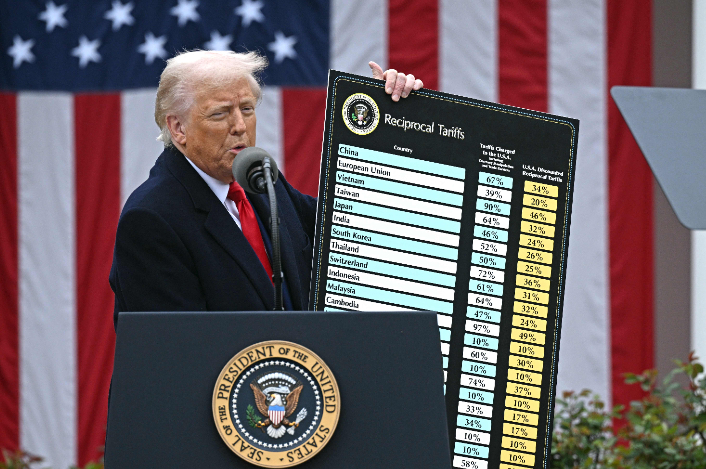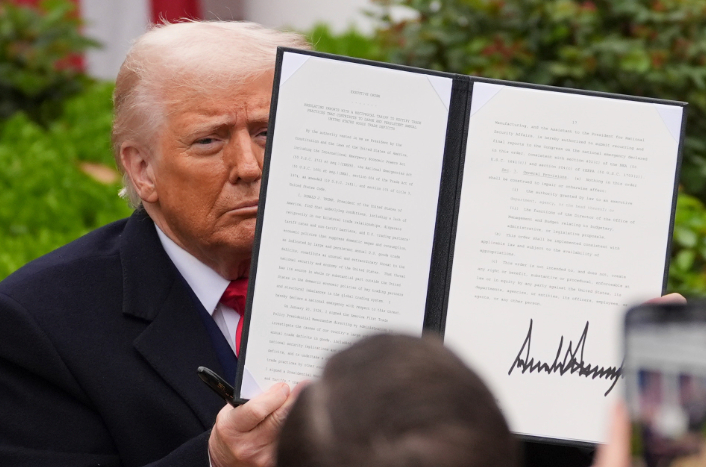
President Trump holds up a chart of reciprocal tariff rates by country in the Rose Garden of the White House in Washington on the 2nd (local time).
As US President Donald Trump announced plans to impose a 10% universal tariff and reciprocal tariffs on a country-by-country basis on the 2nd (local time), none of his major trading partners were able to avoid high tariffs of 20% or more.
Among the major trading partners of the United States, the country that has been hit with the highest tariff bomb is Vietnam. Vietnam received a 46% tariff notification on this day. According to the Office of the United States Trade Representative (USTR), Vietnam's exports to the United States last year were $136.6 billion, up 19.3% from the previous year. This is a higher figure than Korea ($131.6 billion).
The reason Vietnam was subject to high tariffs is because its exports to the US are so large and it is also seen as a conduit for Chinese exports to the US, and it is interpreted that the US has taken the strongest retaliatory action with tariffs.
Taiwan, which supplies cutting-edge semiconductors needed by the U.S., especially TSMC, will also be subject to a 32% tariff. Taiwan is also one of the countries that has a large trade surplus with the U.S.
Previously, TSMC had been trying to expand production in the U.S. by building a new semiconductor plant in Arizona and investing $100 billion in response to U.S. tariff pressure, but Taiwan was ultimately unable to avoid high taxes.
The Trump administration also announced that it would impose a 20% tariff on the European Union (EU), estimating that the EU's tariff rate on the United States is 39%. In particular, it expressed strong displeasure with the EU's non-tariff barriers, such as value-added tax (VAT) and technical regulations.
In his announcement that day, President Trump mentioned the EU, saying, "We are now going to charge the EU," and "You think the EU is very friendly, but they are rip-offs for us. It's really sad and unfortunate."
Regarding this, American political media outlet Politico reported that "President Trump has placed the EU in the worst category of America's trading partners and imposed a 20% tariff on all imports," and that "he has hit 'pathetic' Europe hard."
On the other hand, the UK, which left the EU, will only be subject to a 10% universal tariff without any additional tariffs. The Guardian analyzed that this means, "Prime Minister Keir Starmer's more conciliatory approach to the Trump administration appears to have borne fruit."
President Trump also imposed a 24% tariff on Japan on the same day. He pointed out the trade gap in the automobile sector, saying, "In many cases, our allies are worse than our enemies when it comes to trade."
He argued that "as a result of these enormous trade barriers, 81 percent of the cars sold in Korea are made in Korea, and 94 percent of the cars sold in Japan are made in Japan. Toyota sells a million foreign-made cars in the United States, while General Motors sells hardly any and Ford sells very little."
He announced that he would impose a 34% tariff on China, a trade war partner. The Trump administration imposed a 20% universal tariff on Chinese products immediately after taking office, and if this reciprocal tariff is included, a total tariff of 54% will be applied.
China is expected to retaliate against the U.S. measures. China has already responded by imposing tariffs of up to 15% on U.S. coal, crude oil, livestock products, and agricultural products.
Meanwhile, Korea's reciprocal tariff rate was set at 25%. Acting President and Prime Minister Han Duck-soo held an 'Emergency Economic Security Strategy TF (Task Force) Meeting' this morning and discussed the government's response measures.







